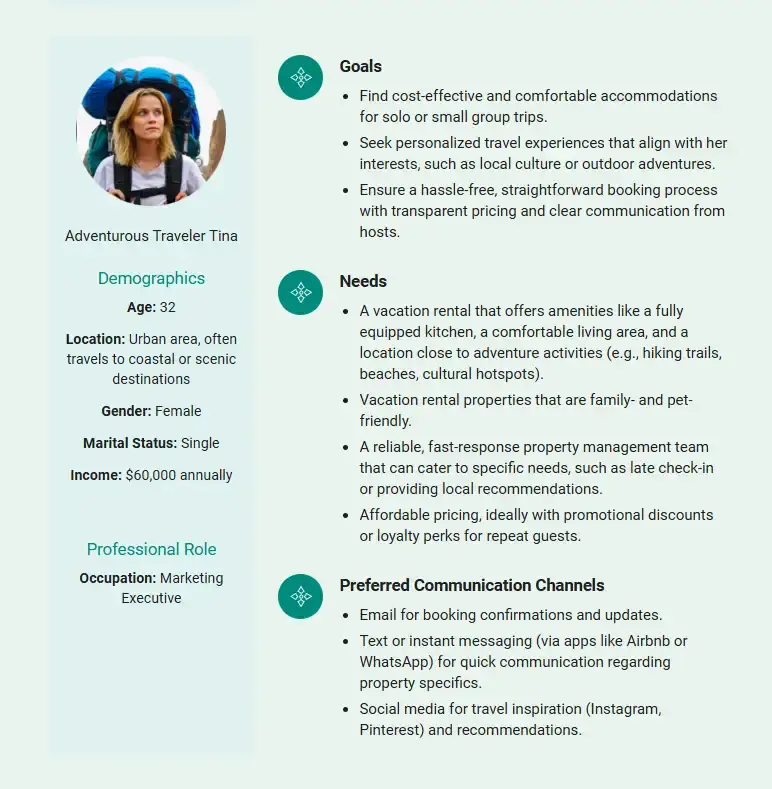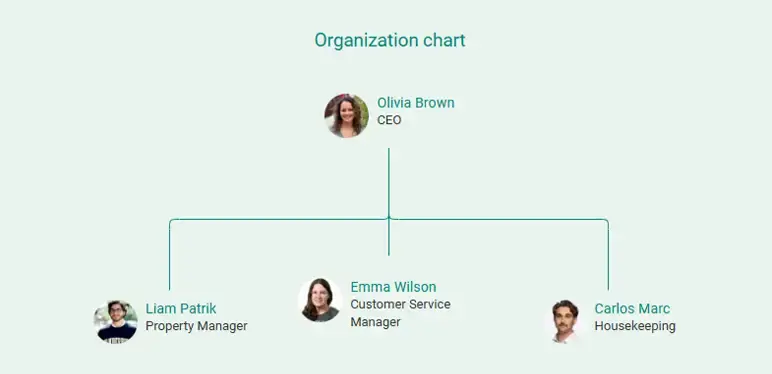Running a vacation rental business can be an exciting way to create unforgettable memories for your guests while managing your own property.
But when it comes to writing a business plan, things often get tricky. Even Levi Silva, the Owner of Vivid Vacation Rentals, LLC, felt the same.
I recently had a chance to chat with Levi about how he started his journey.
He shared how a business plan helped him turn his ideas into a thriving business, including the challenges he faced along the way.
Based on that conversation, I’ve created this detailed guide to help you get started.
What is a vacation rental business plan?
A vacation rental business plan is a clear, detailed guide for starting and growing a successful vacation rental company.
It typically includes important details like your vacation rental business goals, target customers, services offered, pricing strategy, marketing tactics, and financial projections.
In short, it serves as a strategic blueprint to ensure your business runs smoothly, attracts more visitors, and grows over time.
Why do you need to write a vacation rental business plan?
Starting a vacation rental business without a plan is like traveling without a map—you may find yourself somewhere, but not where you want to be.
That’s why keeping a solid business plan is essential. It will clearly state the objectives, services, and amenities offered by your rentals, identify target guests, and map out marketing strategies.
It also helps in estimating costs, pricing, and ensuring profitability. On top of that, it prepares you for property maintenance, staffing, and guest promotions.
If you’re looking for funding, a good business plan shows lenders and investors that you’ve done your research and have a solid strategy to make your vacation rental a success.
How to create a vacation rental business plan?
Writing a business plan for your short term rental business requires careful attention to various key components and sections that define your business goals and strategies to reach them.
Here’s a step-by-step guide to build a successful vacation rental business plan:
1. Executive summary
The executive summary is the first section of your vacation rental business plan and gives a quick, clear overview of your vacation rental property.
Consider writing this section at last after completing the other key sections of your plan. This will help you summarize the most important points of your business effectively.
Here’s what to include in this section:
- Name and location of your vacation rental property
- Vision and future goals
- Properties and services you’ll offer to guests
- Market opportunities
- Marketing and promotional strategies
- Summary of your financial projections
Overall, it’s a brief introduction to grab the attention of potential investors or partners and encourage them to support your business. Make it clear, interesting, and to the point.
"Writing the executive summary was tough at first because I had to capture the heart of my vacation rental in just a few lines.
Finding the right words to explain what makes our place special, while keeping it simple, wasn’t easy. But after researching the market and refining what makes us unique, everything finally clicked.
I felt a huge sense of relief once I had a summary that clearly showed our potential—it really helped bring everything into focus."—Levi Silva
2. Business description
In the business description section, provide a detailed outline of your vacation rental company, giving an in-depth understanding of your business concept and goals.
This section highlights what your business is about and covers fundamental details investors or partners should know.
While planning this section, be sure to include these elements:
- Business legal structure
- Your vision and mission statement
- Core values
- The owners or partners
- Background information
- Short-term and long-term goals
This section gives an in-depth look at the foundation and direction of your vacation rental business. Keep it professional yet simple to effectively communicate your vision and leave a lasting impression.
"In the beginning, it was tough to figure out how to describe my vacation rental business. I didn’t know how to explain what made our place special or how to organize everything.
Once I got clear on the type of experience we wanted to offer and why our property was unique, it all clicked.
By setting clear goals and focusing on guest satisfaction, I felt ready to take the next step."—Levi Silva
3. Market research
Conducting thorough market research lets you better understand the vacation rental industry and the local tourism market in-depth.
This will show potential investors or partners that you’ve done the necessary groundwork and have a well-thought-out strategy for positioning your business up for success.
To make this section effective, be sure to include the following elements:
- Size of the vacation rental market
- Industry growth forecasts
- Market demand
- Local regulatory requirements
- Current market trends
By analyzing these factors, you can identify growth opportunities, adapt to industry trends, and develop a strong market positioning strategy.
"Conducting market research for my vacation rental was tricky at first. I had to really dive into trends and understand what travelers were looking for in the area.
Once I saw the demand for unique, well-located properties, I felt confident about what I had to offer. It gave me the clarity I needed to proceed with the business."—Levi Silva
4. Customer analysis
Customer analysis for your vacation rental business is about understanding who stays at your properties and what they need.
Start by figuring out who your ideal guests are. Are they families looking for spacious homes, or business travelers who need convenient locations and amenities for work? Knowing this helps you offer what they want.
Think about what your guests value—comfortable amenities, great locations, or a good price. This can guide you in tailoring your rentals to suit their needs.
Also, consider how your customers find and book rentals—do they book through websites like Airbnb or prefer contacting you directly? This helps with your marketing strategy.
If applicable, create a buyer persona to better know your customers and customize your property offerings to attract them. For instance:

By understanding your guests, you can provide the right experience and set prices that work for them, ensuring you attract more bookings.
"Figuring out who my ideal guests were took some time. At first, I was unsure whether to cater to families, solo travelers, or couples.
Once I understood the types of experiences people were looking for—like relaxing stays or adventurous getaways—it all clicked.
Knowing my target audience has helped me tailor my property and services to meet their needs and attract more bookings."—Levi Silva
5. Competitive analysis
Competitive analysis helps you understand who your competitors are and what makes your business unique.
Start by looking at other vacation rental properties in your area. Check their location, pricing, and what they offer. See how your rentals measure up against theirs.
Look at their prices—are they cheaper or more expensive? Find out how they promote their properties and where they list them, like on Airbnb or other booking sites.
Read reviews from their guests to understand what people like or don’t like. This can help you see where you can improve and provide a better experience.
By knowing what your competitors are doing, you can offer something different, stand out, and attract more guests.
"Getting to know my competitors really helped me spot areas where I could stand out in the vacation rental market.
While others offered standard amenities, many missed out on the little extras guests crave, like local guide recommendations and unique, personalized experiences.
By prioritizing these areas and offering special packages, I was able to set my property apart and attract more guests.”—Levi Silva
6. Service offerings
Next, explain the services your vacation rental will offer.
Will your property be for small trips, big family vacations, or business travelers? What extra services will you provide?
List the amenities your rental has, like cozy living spaces, comfortable bedrooms, Wi-Fi, or a fully equipped kitchen. You might also offer services like cleaning or a concierge to help guests with special requests.
Describe your pricing options, such as regular rates, weekend deals, or special rates during busy seasons.
Further, highlight any special features, like great views, proximity to popular attractions, or unique aspects like a garden or private pool.
If your rental has specific features, like being pet-friendly or offering outdoor areas for events, mention that. You could also offer flexible options, like discounts for longer stays or returning guests.
"At first, deciding what services to offer in my vacation rental was a bit of a challenge.
I really wanted my guests to feel at home, so I started by adding personal touches—things like local recommendations and little thoughtful amenities.
As I worked through the details, like making check-ins super easy, creating cozy interiors, and putting together a helpful guest guide, I started to see what really made my rental stand out."—Levi Silva
7. Marketing plan
A good marketing strategy can help you attract enough guests and create a recognizable brand for your vacation rental business.
It outlines strategies to showcase your vacation rental’s unique features and attract more bookings while building customer loyalty. Here are some marketing tactics to include in your plan:
- Promote on social media (Instagram, Facebook, etc.)
- Use SEO to make your rental easy to find online
- List your property on booking sites like Airbnb and Booking.com
- Send email updates with deals and offers
- Partnering with local businesses or travel service providers to offer packages
A well-crafted marketing plan helps you effectively reach potential guests and convince them to choose your vacation rental.
"Creating the marketing plan was tough at first, with so many different strategies to consider.
But by narrowing my focus to platforms like Instagram, collaborating with local businesses, and offering special discounts for first-time guests, I was able to develop a clear and effective strategy to attract bookings.
It was rewarding to see everything come together and realize I had a well-defined path to grow my vacation rental business."—Levi Silva
8. Management team
In this section, explain who will run the vacation rental business and how everything will be managed.
If you are running the rental on your own, describe how you'll handle tasks such as managing property, guest communications, marketing, and maintenance. Share your skills and experience to make you the right person for the job.
If you have a team, briefly introduce the significant roles, for example, the property manager and cleaner, stating how each helps keep the business running.
You can also include a simple organizational chart to show how everyone works together. Like:

Additionally, mention any advisory members who provide guidance on business strategy, finances, or operations.
"At first, I struggled to showcase my team’s roles and experience in a way that highlighted our ability to manage the business effectively.
But once I mapped out their skills and added a clear organizational chart, it became evident we had the right team. This also made our business plan for vacation rental more compelling to investors and partners." — Levi Silva
9. Operations plan
The operations plan explains how your vacation rental business will run every day, in terms of managing guests, taking care of properties, and dealing with customers.
Start by outlining how you’re going to make bookings, process guest check-in and check-out, and prepare the property for a guest.
Next, discuss how you’ll maintain the property, including regular cleaning, inspecting furniture and appliances for damage, and handling repairs promptly to keep it in top condition.
If required, mention any staff you'll need, like a property manager or private tourist guide, and how they will help with smooth operations and guest satisfaction.
"Writing the operations plan required thinking about every part of the vacation rental process—from guest communication to housekeeping and ensuring everything runs smoothly.
By breaking it down into clear steps and responsibilities, I created a plan that gave me confidence in managing daily operations effectively and offering a top-notch experience to guests." — Levi Silva
10. Financial plan
Creating a solid financial plan is key to getting investors interested and securing enough funding for your vacation rental business.
This section should provide a summary of your financial projections for the next 3 to 5 years, helping investors understand your business’s growth potential and long-term viability.
Here are some important financial documents you should include in your plan:
- Profit and loss statement (income statement)
- Cash flow statement
- Balance sheet
- Break-even analysis
Furthermore, estimate how much funding you need, how you plan to use that money, your startup costs, and your expected revenue and sales.
Lastly, don’t forget to cover a scenario analysis to show how your business will perform in different situations.
"Financial planning felt overwhelming at first. Projecting income statements, cash flow, and startup costs seemed complicated.
But using a financial forecasting tool made it easier by helping me perform a break-even analysis and pinpoint when the business would start making a profit.
This boosted my confidence in our financial plan and ability to secure the needed funding."—Levi Silva
Download free vacation rental business plan template
Ready to create your vacation rental business plan but not sure where to start? We’ve got you covered! Download our free vacation rental business plan template in PDF and begin today.
This template has helped thousands of entrepreneurs start their business successfully. I hope it does to you as well and lets you create a solid plan with practical examples and tips. Or else download it and customize it to suit your needs.
Get help writing your business plan
Now that you’ve gone through this guide and the free template, it should be much easier for you to create your own vacation rental business plan.
But if you still require expert-level guidance, our business plan consultants are here to assist. They’ll offer valuable insights and guidance to help you craft a plan that aligns with your vacation rental goals.
Don’t wait—start building your dream vacation rental business today with a strong, well-designed plan!
Frequently Asked Questions
What key components should a vacation rental business plan include?
A vacation rental business plan should include the following key components:
- Executive summary
- Business description
- Market research
- Customer analysis
- Competitive analysis
- Service offerings
- Marketing plan
- Management team
- Operations plan
- Financial plan
Can I adapt my vacation rental business plan over time?
Yes, you can adapt your vacation rental business plan over time as your business grows or market conditions change. It's important to review and update your plan regularly to reflect new goals, strategies, or financial projections.
Where to find business plan writers for your short term rental business?
You can find business plan writers for your short-term rental business on platforms like Upwork, Fiverr, Freelancer, or through LinkedIn. You can also consider business consulting firms specializing in short-term rental businesses or online business plan writing service providers.
What should be the ideal length of a vacation rental business plan?
The ideal length of a vacation rental property business plan is typically 15 to 25 pages. Typically, business plan length depends on the type of plan you’re writing and the level of detail included.

